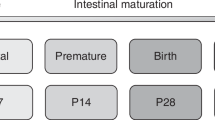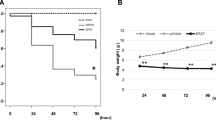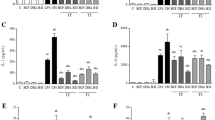Abstract
Background:
Evidence suggests that excessive inflammation of the immature intestine may predispose premature infants to necrotizing enterocolitis (NEC). We investigated the anti-inflammatory effects of docosahexaenoic acid (DHA), eicosapentaenoic acid (EPA), and arachidonic acid (ARA) in human fetal and adult intestinal epithelial cells (IEC) in primary culture.
Methods:
Human fetal IEC in culture were derived from a healthy fetal small intestine (H4) or resected small intestine of a neonate with NEC (NEC-IEC). Intestinal cell lines Caco2 and NCM460 in culture were used as models for mature IEC. IEC in culture were pretreated with 100 µmol/l palmitic acid (PAL), DHA, EPA, ARA, or ARA+DHA for 48 h and then stimulated with proinflammatory IL-1β.
Results:
DHA significantly attenuated IL-1β induced proinflammatory IL-8 and IL-6 protein and mRNA in fetal H4, NEC-IEC, and mature Caco2, NCM460 IEC, compared to control and PAL treatment. DHA downregulated IL-1R1 (IL-1β receptor) and NFk β1 mRNA expression in fetal and adult IEC. ARA had potent anti-inflammatory effects with lower IL-8 and IL-6 (protein and mRNA) in fetal H4 but not in NEC-IEC or adult IEC.
Conclusion:
The present study provides evidence that DHA and ARA may have important anti-inflammatory functions for prevention of NEC in premature infants.
Similar content being viewed by others
Log in or create a free account to read this content
Gain free access to this article, as well as selected content from this journal and more on nature.com
or
References
Neu J, Walker WA. Necrotizing enterocolitis. N Engl J Med 2011;364:255–64.
Henry MC, Moss RL. Necrotizing enterocolitis. Annu Rev Med 2009;60:111–24.
Gephart SM, McGrath JM, Effken JA, Halpern MD. Necrotizing enterocolitis risk: state of the science. Adv Neonatal Care 2012;12:77–87; quiz 88–9.
Nanthakumar N, Meng D, Goldstein AM, et al. The mechanism of excessive intestinal inflammation in necrotizing enterocolitis: an immature innate immune response. PLoS One 2011;6:e17776.
Chan KY, Leung KT, Tam YH, et al. Genome-wide expression profiles of necrotizing enterocolitis versus spontaneous intestinal perforation in human intestinal tissues: dysregulation of functional pathways. Ann Surg 2014;260:1128–37.
De Plaen IG, Liu SX, Tian R, et al. Inhibition of nuclear factor-kappaB ameliorates bowel injury and prolongs survival in a neonatal rat model of necrotizing enterocolitis. Pediatr Res 2007;61:716–21.
Brenna JT, Varamini B, Jensen RG, Diersen-Schade DA, Boettcher JA, Arterburn LM. Docosahexaenoic and arachidonic acid concentrations in human breast milk worldwide. Am J Clin Nutr 2007;85:1457–64.
Zhang P, Lavoie PM, Lacaze-Masmonteil T, Rhainds M, Marc I. Omega-3 long-chain polyunsaturated fatty acids for extremely preterm infants: a systematic review. Pediatrics 2014;134:120–34.
Carlson SE, Montalto MB, Ponder DL, Werkman SH, Korones SB. Lower incidence of necrotizing enterocolitis in infants fed a preterm formula with egg phospholipids. Pediatr Res 1998;44:491–8.
Fewtrell MS, Morley R, Abbott RA, et al. Double-blind, randomized trial of long-chain polyunsaturated fatty acid supplementation in formula fed to preterm infants. Pediatrics 2002;110(1 Pt 1):73–82.
Ganguli K, Meng D, Rautava S, Lu L, Walker WA, Nanthakumar N. Probiotics prevent necrotizing enterocolitis by modulating enterocyte genes that regulate innate immune-mediated inflammation. Am J Physiol Gastrointest Liver Physiol 2013;304:G132–41.
Claud EC, Lu L, Anton PM, Savidge T, Walker WA, Cherayil BJ. Developmentally regulated IkappaB expression in intestinal epithelium and susceptibility to flagellin-induced inflammation. Proc Natl Acad Sci USA 2004;101:7404–8.
Liu Y, Chen F, Odle J, et al. Fish oil enhances intestinal integrity and inhibits TLR4 and NOD2 signaling pathways in weaned pigs after LPS challenge. J Nutr 2012;142:2017–24.
Innis SM, Dai C, Wu X, Buchan AM, Jacobson K. Perinatal lipid nutrition alters early intestinal development and programs the response to experimental colitis in young adult rats. Am J Physiol Gastrointest Liver Physiol 2010;299:G1376–85.
Kihara A. Very long-chain fatty acids: elongation, physiology and related disorders. J Biochem 2012;152:387–95.
Harkewicz R, Du H, Tong Z, et al. Essential role of ELOVL4 protein in very long chain fatty acid synthesis and retinal function. J Biol Chem 2012;287:11469–80.
Ohtsuka Y, Okada K, Yamakawa Y, et al. ω-3 fatty acids attenuate mucosal inflammation in premature rat pups. J Pediatr Surg 2011;46:489–95.
Lu J, Jilling T, Li D, Caplan MS. Polyunsaturated fatty acid supplementation alters proinflammatory gene expression and reduces the incidence of necrotizing enterocolitis in a neonatal rat model. Pediatr Res 2007;61:427–32.
Garlanda C, Mantovani A. Ligands and receptors of the interleukin-1 family in immunity and disease. Front Immunol 2013;4:396.
Nanthakumar NN, Fusunyan RD, Sanderson I, Walker WA. Inflammation in the developing human intestine: A possible pathophysiologic contribution to necrotizing enterocolitis. Proc Natl Acad Sci USA 2000;97:6043–8.
Massaro M, Habib A, Lubrano L, et al. The omega-3 fatty acid docosahexaenoate attenuates endothelial cyclooxygenase-2 induction through both NADP(H) oxidase and PKC epsilon inhibition. Proc Natl Acad Sci USA 2006;103:15184–9.
Jacobi SK, Moeser AJ, Corl BA, Harrell RJ, Blikslager AT, Odle J. Dietary long-chain PUFA enhance acute repair of ischemia-injured intestine of suckling pigs. J Nutr 2012;142:1266–71.
Norris PC, Dennis EA. Omega-3 fatty acids cause dramatic changes in TLR4 and purinergic eicosanoid signaling. Proc Natl Acad Sci USA 2012;109:8517–22.
Claud EC, Savidge T, Walker WA. Modulation of human intestinal epithelial cell IL-8 secretion by human milk factors. Pediatr Res 2003;53:419–25.
Reardon HT, Hsieh AT, Park WJ, et al. Dietary long-chain polyunsaturated fatty acids upregulate expression of FADS3 transcripts. Prostaglandins Leukot Essent Fatty Acids 2013;88:15–9.
Park WJ, Kothapalli KS, Lawrence P, Tyburczy C, Brenna JT. An alternate pathway to long-chain polyunsaturates: the FADS2 gene product Delta8-desaturates 20:2n-6 and 20:3n-3. J Lipid Res 2009;50:1195–202.
Acknowledgements
The authors acknowledge Nanda Shanmugam (Mucosal Immunology and Biology Research Center, Massachusetts General Hospital for Children, Boston, MA) for assistance with qRT-PCR work; Maureen Garron and Suzette McCarron (Mucosal Immunology and Biology Research Center, Massachusetts General Hospital for Children, Boston, MA) for administrative support.
Author information
Authors and Affiliations
Corresponding author
Supplementary information
Supplementary Table
(DOC 70 kb)
Rights and permissions
About this article
Cite this article
Wijendran, V., Brenna, J., Wang, D. et al. Long-chain polyunsaturated fatty acids attenuate the IL-1β-induced proinflammatory response in human fetal intestinal epithelial cells. Pediatr Res 78, 626–633 (2015). https://doi.org/10.1038/pr.2015.154
Received:
Accepted:
Published:
Issue date:
DOI: https://doi.org/10.1038/pr.2015.154
This article is cited by
-
Maternal circadian rhythm disruption affects neonatal inflammation via metabolic reprograming of myeloid cells
Nature Metabolism (2024)
-
Role of omega-3 polyunsaturated fatty acids, citrus pectin, and milk-derived exosomes on intestinal barrier integrity and immunity in animals
Journal of Animal Science and Biotechnology (2022)
-
Potential role of endoplasmic reticulum stress is involved in the protection of fish oil on neonatal rats with necrotizing enterocolitis
Scientific Reports (2020)
-
Lipoic Acid and Fish Oil Combination Potentiates Neuroinflammation and Oxidative Stress Regulation and Prevents Cognitive Decline of Rats After Sepsis
Molecular Neurobiology (2020)
-
The cis-trans binding strength defined by motif frequencies facilitates statistical inference of transcriptional regulation
BMC Bioinformatics (2019)



